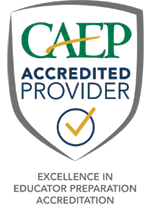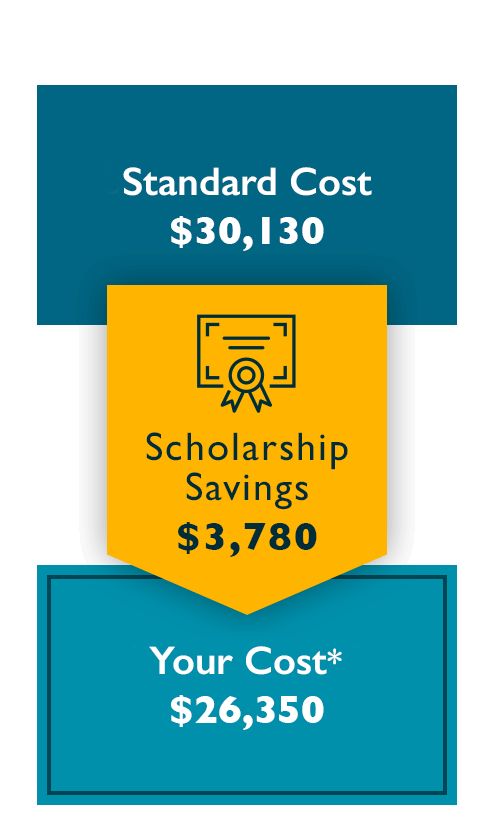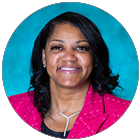Why Choose Walden?
Program Details
Curriculum
Completion Requirements
- 46 semester credits
- Virtual Field Experience (VFE®)
View the COMPLETE CURRICULUM PLAN.
Time to completion will vary by student, depending on individual progress and credits transferred, if applicable. For a personalized estimate of your time to completion, call an Enrollment Specialist at 1-866-492-5336.
Earn a Degree From a CAEP-Accredited College of Education

Admission Requirements
Program Admission Considerations: A bachelor's degree or higher.
General Admission Requirements: Completed online application and transcripts. Please note that the materials you are required to submit may vary depending on the academic program to which you apply. More information for international applicants.
| Curriculum Component | Requirements | Cost | AMOUNT |
|---|---|---|---|
| Tuition | 46 semester credit hours | $630 per semester hour | $28,980 |
| Program Fee | Per semester | $230 | $1,150 |
| $30,130** | |||
| BELIEVE & ACHIEVE SCHOLARSHIP YOUR TUITION |
-$3,780 $26,350* |
||
*Represents minimum time to completion and Believe & Achieve Scholarship. Your actual total program time and costs may vary. Believe & Achieve Scholarship savings based on current tuition. See Scholarship Details for more information.
**The tuition reflects the minimum time to completion. Time to completion varies by student, depending on individual progress and credits transferred, if applicable. Tuition and time to complete may be reduced if transfer credits are accepted, or if you receive grants, scholarships or other tuition reductions. Walden may accept up to 6 transfer credits. For a personalized estimate of the number of your transfer credits that Walden would accept, call an Enrollment Specialist at 844-768-1080.
Tuition and fees are subject to change. Books and materials are not included and may cost between $1,000 to $1,200.
Program Outcomes
Launch Your Future in Special Education
Walden’s online MAT program with a specialization in Special Education prepares you to apply for licensure as a K–Age 21 special education teacher. Through coursework embedded with insights from subject matter experts, you’ll gain skills you can apply immediately in the classroom. Build your expertise in collaboration, special education law, and advocacy and lead transformative change for students with exceptional needs.
Career Outlook
Qualified, compassionate special education teachers are in demand. The U.S. Department of Education projects that 45 states will have a shortage of special education teachers in the 2020–2021 school year.2
With a Master of Arts in Teaching degree, you’ll be eligible to apply for a special education teaching license—a vital credential that can open doors in your career. Impact your community as a voice for students with special needs. Help children with challenges discover their own love of learning and grow to become their best selves.
A Master of Arts in Teaching degree can position you to pursue career options such as:4
-
Special education teachers
-
Special education instructional leaders
-
Educational consultant
-
Special education advocate
A Master of Arts in Teaching degree can position you to work in settings such as:
-
K–12 school settings
-
Private/therapeutic settings serving students with mild to moderate disabilities
-
Agencies working with people with mild to moderate disabilities
-
Consulting and advocacy agencies
Career options may require additional experience, training, or other factors beyond the successful completion of this degree program.
Learning Outcomes - Master of Arts in Teaching Program
Graduates of Walden’s online Master of Arts in Teaching program with a specialization in Special Education will be prepared to:
- Understand the central concepts, tools of inquiry, and structures of the discipline he or she teaches and can create learning experiences that make these aspects of the subject matter meaningful for students.
- Understand how children learn and develop and can provide learning opportunities that support a child’s intellectual, social, and personal development.
- Understand and use a variety of instructional strategies to encourage student development of critical thinking, problem-solving, and performance skills.
- Plan instruction based upon knowledge of the subject matter, students, community, and curriculum goals.
- Understand and use formal and informal assessment strategies to evaluate and ensure the continuous intellectual, social, and physical development of the learner.
- Be a reflective practitioner who continually evaluates the effects of his or her choices and actions on others (students, parents, and other professionals in the learning community) and who actively seeks out opportunities to grow professionally.
- Use knowledge of effective verbal, nonverbal, and media communication techniques to foster active inquiry, collaboration, and supportive interaction in the classroom.
- Foster relationships with school colleagues, parents, and agencies in the larger community to support students’ learning and well-being.
- Understand how students differ in their approaches to learning and create instructional opportunities that are adapted to diverse learners.
- Use an understanding of individual and group motivation and behavior to create a learning environment that encourages positive social interaction, active engagement in learning, and self-motivation.
Testimonials
Related Articles
FAQ About Walden’s Online Master of Arts in Teaching - Special Education (K-Age 21)
Here’s a basic outline of the steps to follow if you’re considering becoming a K–12 educator:
- Understand the licensure requirements for the state in which you wish to teach. Simply contact the state’s board or department of education to learn about the specific rules and policies they have in place regarding teacher licensure and teacher certification.
- Determine whether you wish to teach in an elementary or secondary school, and choose a specialization if you’d like to further focus your studies.
- Choose a university from which to earn your degree, and make sure the teacher licensure preparation program you need is offered. Often, this is a Master of Arts in Teaching (also known as an MAT degree). If you’re earning your degree through a university’s online program, be sure to speak with an Enrollment Specialist—and your state’s department of education—to confirm that the teacher licensure preparation program is approved in your state. Also, ask if your state is a “license-in-hand” or “program completer” state to determine which tests you will ultimately take.
- Review the university or degree program accreditation when selecting where to study. Council for the Accreditation of Educator Preparation (CAEP) accreditation is a nationally recognized standard for excellence in education and is a strong indicator of quality.
- Earn your master’s in teaching or a similar degree—yes, this is a big step, but necessary and worthwhile—so that you are eligible to sit for your state’s teacher licensure exam. Your state may require an institutional recommendation form, which, along with your transcripts, verifies that you have completed a teacher licensure preparation program.
- Pass your state’s teacher certification exam and become a licensed educator.
Professionals seeking a Master of Arts in Teaching (MAT) are looking to earn their first teaching license in a specific field, and they often hold a bachelor’s in a discipline other than education. There are a variety of options when it comes to choosing the right program, but a few key factors should always be considered before deciding, including accreditation, flexibility, diversity, and support. First, look for an MAT program offered at an accredited university. CAEP accreditation signals the quality of a university’s educator preparation programs, as well as the university’s commitment to continuous assessment and improvement. Flexible scheduling is also important for working professionals, which is why online degree programs are such a popular choice. It’s also vital to be able to connect with other professionals with diverse backgrounds, perspectives, and experiences, which can greatly enhance your MAT experience. Lastly, be sure you choose a university with a strong support team that is invested in helping you succeed.
The Council for the Accreditation of Educator Preparation (CAEP) is a recognized national accreditor for educator preparation and aims to promote excellence through quality assurance and continuous assessment and improvement. The Richard W. Riley College of Education and Human Sciences is accredited by CAEP for a period of seven years, from April 2019 through June 2026. This accreditation covers initial teacher preparation programs and advanced educator preparation programs—including the BS in Elementary Education program. The Riley College of Education and Human Sciences earned CAEP accreditation by meeting rigorous national standards and demonstrating excellence in the areas of content and pedagogy, clinical experiences, selectivity, program impact, and capacity for continuous improvement.
From 2016 to 2028, the number of U.S. students attending public schools is expected to grow 2% to 51.4 million.1 This creates an ongoing demand for highly qualified teachers who are prepared to meet students’ academic needs—and you could be one of them. If you have a passion for learning and the desire to help children develop the skills they need to succeed in life, choosing a teacher licensure preparation program like Walden’s Master of Arts in Teaching program is a good choice. Gain the competencies and knowledge you need to earn your license and begin to make a difference in students’ lives.
An MAT degree program can provide you with the fundamentals of classroom management, the foundations of literacy, the skills to work with diverse learners, and best practices for being effective in the classroom and in your school. Walden University’s MAT program has a specialization in Special Education (K–Age 21), which means you will also learn strategies to help effectively teach learners with exceptionalities.
1Walden’s Master of Arts in Teaching program is nationally recognized by the Council for Exceptional Children (CEC). Walden is listed as a CEC-recognized program in Minnesota. Seehttp://www.ncate.org/provider-search?state=&program=CEC&tab=program#progresults.
2Source: U.S. Department of Education, Office of Postsecondary Education, Teacher Shortage Areas Listing 1990–1991 through 2020–2021. Active selections: “School Year: 2020-2021” AND State: ALL AND Subject Matter: Special Education.
3Source: Walden University Office of Institutional Research and Assessment (OIRA), as of December 31, 2019.
4Source: Labor Insights (Burning Glass Technologies). Industry Analysis, Active selections "nationwide" AND last 12 months” AND “Industry: educational services” AND “keywords: special education” AND “education: master’s” Retrieved March 2020.
Accreditation
Walden University’s Richard W. Riley College of Education and Human Sciences is accredited based on the Council for the Accreditation of Educator Preparation (CAEP) Standards through June 2026. This accreditation covers specific Walden initial teacher and advanced educator preparation programs, including the BS in Elementary Education, Master of Arts in Teaching (MAT) – Special Education specialization, MS in Education – Educational Leadership and Administration specialization, and EdS in Educational Leadership and Administration. The MAT-SPED, MSED-ELA, and EdS-ELA programs were reviewed by Specialized Professional Associations (SPAs), which define content-area standards for programs, and achieved national recognition.
CAEP promotes excellence in educator preparation through quality assurance and continuous improvement. Walden’s College of Education and Human Sciences has earned national accreditation by demonstrating excellence in the areas of content and pedagogy, clinical experiences, selectivity, program impact, and capacity for continuous improvement. CAEP is a Council for Higher Education Accreditation (CHEA) – recognized national accreditor for educator preparation.
Licensure
Walden is approved by the Minnesota Professional Educator Licensing and Standards Board (PELSB) to offer a program leading to a Minnesota Tier 3 license in Special Education: Academic Behavioral Strategist. Candidates seeking licensure in Minnesota are responsible for completing all Minnesota requirements beyond Walden’s state-approved program, including passing the Minnesota Teacher Licensure Exams (MTLEs). The Minnesota Professional Educator Licensing and Standards Board (PELSB) is solely responsible for reviewing applications and issuing licenses.
Individuals interested in licensure in states other than Minnesota may qualify by virtue of completing a state-approved educator preparation program; however, individuals must review their state’s regulations to ensure the program meets all requirements, paying particular attention to any requirements specific to out-of-state program completers. Individuals who reside in certain states may be ineligible to enroll in this program. Walden Enrollment Specialists can provide guidance on licensure questions; however, it remains the individual’s responsibility to understand and comply with all state licensure requirements. Walden makes no representation or guarantee that completion of Walden coursework or programs will permit an individual to obtain state licensure.
Note to All Pennsylvania residents: Walden University’s teacher preparation program is approved by the Minnesota Professional Educator Licensing and Standards Board as leading to licensure. Because this program is not reviewed by the Pennsylvania Department of Education, candidates are instructed to apply for Pennsylvania certification as out-of-state graduates of a teacher preparation program.
Note to all Washington residents: Eligibility for initial educator certification in Washington is based on completion of a state-approved educator preparation program. This program is approved in Minnesota and is authorized for field placements in Washington by the Professional Educators Standards Board. Even though you may be residing in Washington while in this program, your application for educator certification in Washington will be processed as an out-of-state application. Go to https://www.pesb.wa.gov/educator-pathways/becoming-a-washington-educator/out-of-state-license-transfers/ for more information. Teachers are advised to contact their individual school districts as to whether this program may qualify for teacher advancement.













